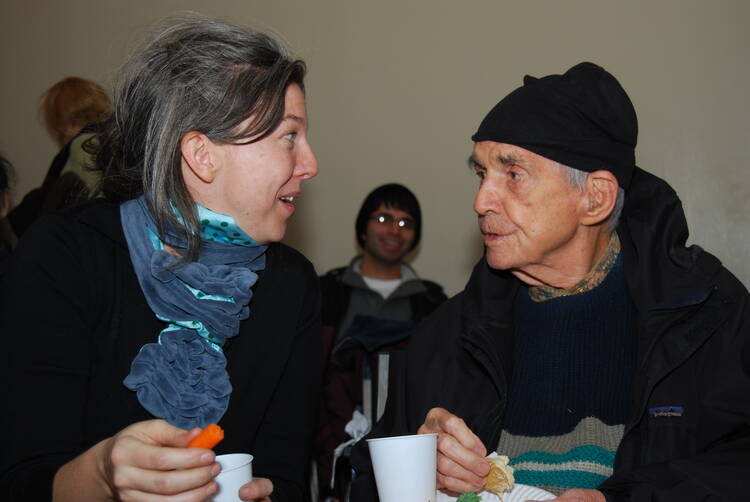Shortly after I graduated from St. Peter’s University in New Jersey, I read a news report of a commencement address Father Dan Berrigan had given at another college. “We must move away from this notion of winners and losers if we are ever to have peace,” Berrigan told the graduating class.
For some reason, I copied that line on a piece of paper and taped it to my bedroom wall. I was about to embark on my first job after graduation, as a reporting intern at The Washington Post, one of the most competitive newsrooms in America. The Post at the time was a place where the executive editor extolled the virtues of “creative tension,” as if tension in any form could prove to be a good thing.
I recognized that I’d face competition at The Post from other eager young reporters who had graduated from universities with a far higher profile than my relatively small Catholic liberal arts alma mater. Father Berrigan’s quote reminded me to make my mark based on hard work and decency—through a commitment to do my best, rather than a hunger to get ahead.
It’s a principle I tried to abide by throughout my career, with some measure of success. I still cringe at the memories of those times I did let my competitive instinct propel me, or that I put my drive to "get the story" above the people around me.
I received another unexpected lesson from Father Berrigan after reading many of the appreciations that appeared about him following his death on April 30. I particularly liked a story his niece related in The New York Times. Frida Berrigan told of opening her uncle’s closet to find the same few threadbare shirts and slacks he had worn for years. “He had a shiny old black raincoat that he wore to every demonstration,” his niece said, “Just Google the images of him...." Hanging there too was the same shirt he had worn to both her and her cousin’s weddings—15 years apart.
Lessons in that kind of simplicity are rare at a time when one presidential candidate earns $250,000 for giving a single speech and another travels in his own commercial-size jetliner and builds hotels, office towers and residences affordable only to the “one percent.” Mainly, though, I find Father Berrigan’s simplicity an indictment of my own cluttered life. My closets burgeon with sometimes never-worn clothes and shoes. My basement is full of old appliances, suitcases, computers, stereos and CDs I can’t seem to throw out or give away.
When I pack a box of clothing to donate to a local parish’s second-hand store, I am more likely to pull out some of the items at the last minute, than I am to put a few additional ones in.
I should know better. I remember watching as Catholic Charities carted off the living room furniture from my parents’ home after my mother died. There was the pale blue couch she always worried one of us would stain. There was the wooden coffee table we didn’t dare put a cup on for fear we’d damage it. What good were they to her now?
But still I hold on to the stuff in my own life. I am always impressed by the sisters at Mount St. Scholastica Monastery in Atchison, Kan., where I have spent time as a frequent visitor. Every time they claim an item of clothing to wear from their recycle shop, they try to put another one in for someone else’s use.
As a Lenten practice, the Benedictine sisters of Erie, Pa., rummage through their closets every year to see what they can give away to the poor. Father Berrigan famously traveled with just the contents of a thin blue backpack. I travel with an extra carry-on case just for my personal toiletries and make up!
The example of the Benedictine sisters and Father Berrigan inspires me to rethink just what a life of simplicity means. How much is enough? I’m sure if I tried, I could actually give away that ski jacket I’ve held onto since 1980. I could travel with a few less tubs of face cream. I could find an appreciative home for those old computers.
Mostly I need to explore within myself why I cling to so many things.
Judith Valenteis America's Chicago correspondent.








